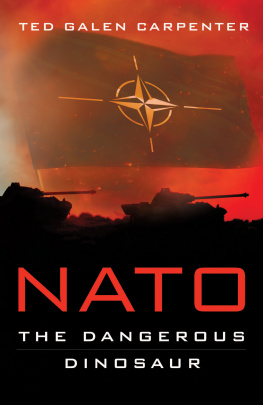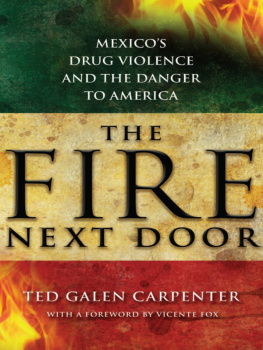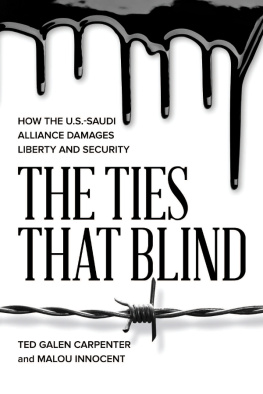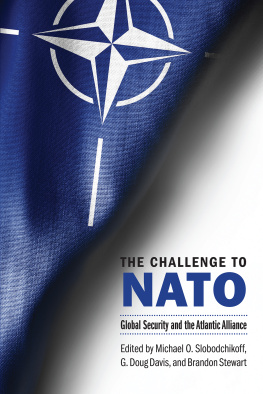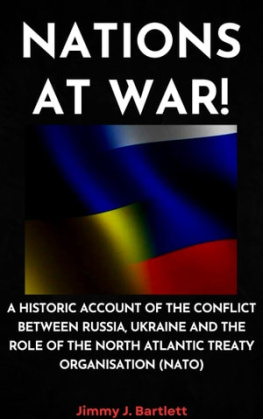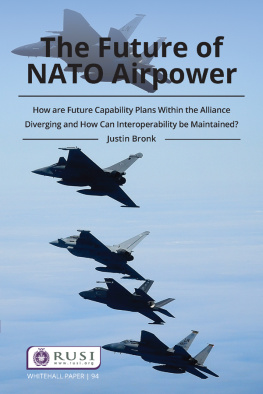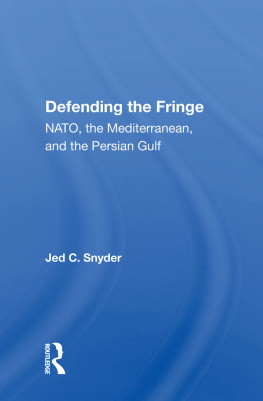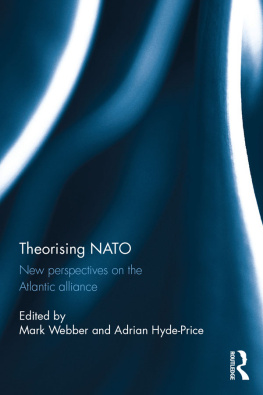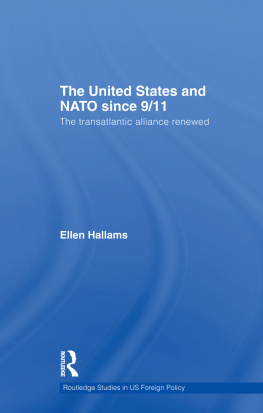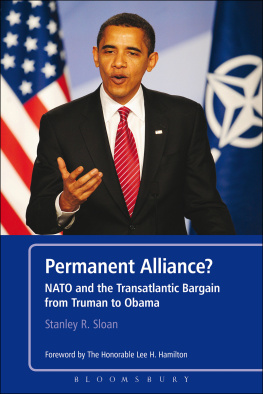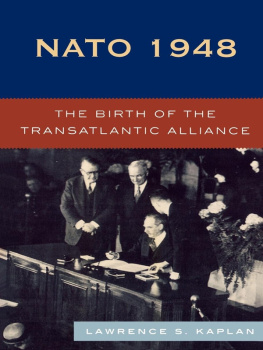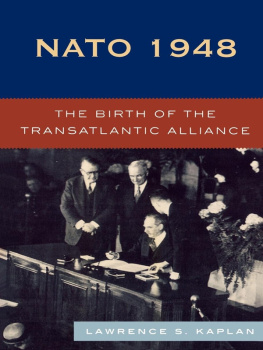Ted Galen Carpenter - NATO: The Dangerous Dinosaur
Here you can read online Ted Galen Carpenter - NATO: The Dangerous Dinosaur full text of the book (entire story) in english for free. Download pdf and epub, get meaning, cover and reviews about this ebook. year: 2 Aug 2019, publisher: Cato Institute, genre: Science / Politics. Description of the work, (preface) as well as reviews are available. Best literature library LitArk.com created for fans of good reading and offers a wide selection of genres:
Romance novel
Science fiction
Adventure
Detective
Science
History
Home and family
Prose
Art
Politics
Computer
Non-fiction
Religion
Business
Children
Humor
Choose a favorite category and find really read worthwhile books. Enjoy immersion in the world of imagination, feel the emotions of the characters or learn something new for yourself, make an fascinating discovery.
- Book:NATO: The Dangerous Dinosaur
- Author:
- Publisher:Cato Institute
- Genre:
- Year:2 Aug 2019
- Rating:4 / 5
- Favourites:Add to favourites
- Your mark:
- 80
- 1
- 2
- 3
- 4
- 5
NATO: The Dangerous Dinosaur: summary, description and annotation
We offer to read an annotation, description, summary or preface (depends on what the author of the book "NATO: The Dangerous Dinosaur" wrote himself). If you haven't found the necessary information about the book — write in the comments, we will try to find it.
NATO: The Dangerous Dinosaur — read online for free the complete book (whole text) full work
Below is the text of the book, divided by pages. System saving the place of the last page read, allows you to conveniently read the book "NATO: The Dangerous Dinosaur" online for free, without having to search again every time where you left off. Put a bookmark, and you can go to the page where you finished reading at any time.
Font size:
Interval:
Bookmark:

THE DANGEROUS DINOSAUR
TED GALEN CARPENTER

Copyright 2019 by the Cato Institute.
All rights reserved.
Paperback ISBN: 978-1-948647-61-8
Hardback ISBN: 978-1-948647-62-5
eBook ISBN: 978-1-948647-63-2
Library of Congress Cataloging-in-Publication Data available.
Printed in the United States of America.
Cover design: Jon Meyers
Cato Institute
1000 Massachusetts Ave., NW
Washington, DC 20001
www.cato.org
To my grandchildren: Carson, Savannah, Julian, Miranda, and Ella. May you all survive NATOs unnecessary and dangerous ambitions.
I owe a considerable debt of gratitude to so many people who made this book possible. As usual, Im grateful to the members of Catos board of directors and to Catos management team for consistently supporting my work over the past 34 years. They have always encouraged the Institutes defense and foreign policy scholars to identify what is wrong with Americas foreign policy and play the role of constructive critics who offer worthy alternatives. NATO:The Dangerous Dinosaur is my latest contribution to that ongoing, very important effort. Thanks are also owed to Jason Kuznicki, Eleanor OConnor, Jon Meyers, and the other members of Catos editorial and book production staff for handling the logistics to produce another fine product.
Special appreciation goes out to Christopher A. Preble, vice president for defense and foreign policy studies, and John Glaser, director of foreign policy studies, for guiding this book project and offering numerous constructive suggestions along the way. Im also grateful to several other scholars, including Doug Bandow, Ivan Eland, Christopher Layne, and Walter A. McDougall, for their helpful comments. A sizable scholarly community has developed over the past few decades to support a new, much more prudent U.S. foreign policy based on realism and restraint. In addition to the individuals mentioned above, such impressive analysts as John Mearsheimer, Andrew Bacevich, Jack F. Matlock, Stephen M. Walt, Barry R. Posen, Richard K. Betts, Robert W. Merry, and many others have provided trenchant critiques of NATOs misguided policies since the end of the Cold War.
That intellectual milieu has aided me greatly in preparing the books, journal articles, and opinion pieces Ive written through the years about NATO. But I also owe a great debt to two other individuals who guided me during the early stages of my career. Professor Robert A. Divine, a renowned historian of 20th century U.S. foreign policy, supervised my PhD dissertation and broadened my perspective regarding that fields many complexities. The late Professor David F. Healy supervised my thesis for my master of arts degree and was my first true mentor. His professional guidance, as well as the rigorous scholarship he exhibited in two excellent books of his own on U.S. imperialism, greatly influenced my thinking. Both dedicated scholars emphasized the importance of questioning the conventional wisdom on important issues and daring to present unorthodox, or even unpopular, interpretations if the evidence warranted such conclusions. I have never forgotten those lessons.
Most of all, I appreciate more than words can express the loving support that my wife, Barbara, has given me throughout this and so many other book projects. Her insightful suggestions are exceeded only by her patience. Finally, I am honored to receive the affection and admiration of my grandchildren, Carson, Savannah, Julian, Miranda, and Ella. This book is dedicated to them with the hope of a more peaceful future.
BEYOND BURDEN SHARING
Donald Trump has emerged as the single biggest catalyst for a growing debate on both sides of the Atlantic about the future of the North Atlantic Treaty Organization (NATO) and U.S. policy regarding the alliance. His importance was apparent even before he became president. In his most definitive foreign policy speech during the 2016 presidential campaign, Trump asserted, Our allies are not paying their fair share of the collective defense effort. He added, The countries we are defending must pay for the cost of this defense, and if not, the U.S. must be prepared to let these countries defend themselves. Although the demand was couched in the context of traditional burden-sharing complaints, his comment suggested that the security commitment itself was not open ended or sacrosanct.
In July 2016, Trump indicated that whether the United States would defend the Baltic republics depended on whether they had fulfilled their alliance obligations. Asked during an interview with the New York Times if such NATO countries as Lithuania, Latvia, and Estonia could count on the United States to come to their aid in case of a Russian attack, Trump answered with a question: Have they fulfilled their obligations to us? He then stated that if they fulfill their obligations to us, the answer is yes. Implicitly, if they had not done so, his answer would be no. Indeed, Trump noted later, Were talking about countries that are doing very well. Yes, I would be absolutely prepared to tell those countries, Congratulations, you will be defending yourself [sic]. Reporters observed that Trumps comments sent a chill through Europe.
Both domestic and foreign supporters of the status quothat is, those favoring a tight link between the security policies of the United States and Europereacted with both anger and apprehension. Sen. Lindsey Graham (R-SC) argued, Statements like these make the world more dangerous and the United States less safe. I can only imagine how our allies in NATO, particularly the Baltic states, must feel after reading these comments from Mr. Trump. Im 100 percent certain how Russian president Putin feelshes a very happy man. The Republican nominee for President is essentially telling the Russians and other bad actors that the United States is not fully committed to supporting the NATO alliance.
Since he became president, Trump has diluted some of his more critical comments about NATO, and his administrations actual policies have not differed all that much from those of his predecessors. Indeed, some of his first actions as president were to walk back his earlier depiction of NATO as obsolete and to emphasize that he believed the alliance still served a crucial function. Members of Trumps foreign policy team went to even greater lengths to reassure the European allies.
Nevertheless, Trumps apparent ambivalence toward NATO, including the Article 5 commitment proclaiming that an attack on one member is an attack on all, has surfaced periodically since he entered the Oval Office. In January 2019, the New York Times broke a major story noting that, in conversations with other officials in 2018, Trump had indicated on several occasions a willingness to withdraw the United States from the alliance.
Speculation about Trumps allegedly frosty attitude toward NATO beyond the burden-sharing issue exceeds the available evidence, however. On the eve of the May 2017 NATO summit, Brookings Institution scholar Thomas Wright observed, President Trump is the only American president since NATOs founding who has not explicitly endorsed Article 5.
The presidents behavior before and during the July 2018 summit raised new questions about his respect for the NATO allies and the sincerity of his commitment to Article 5. But alliance defenders habitually overstated the scope and nature of his criticisms. Once again, the source of his discontent was a perceived lack of burden sharing by the other NATO members. His goal was more serious, substantive defense efforts on the part of Washingtons European security partners. Once they satisfied his wishes on that issue (at least rhetorically), Trump expressed fulsome praise for the alliance.
Font size:
Interval:
Bookmark:
Similar books «NATO: The Dangerous Dinosaur»
Look at similar books to NATO: The Dangerous Dinosaur. We have selected literature similar in name and meaning in the hope of providing readers with more options to find new, interesting, not yet read works.
Discussion, reviews of the book NATO: The Dangerous Dinosaur and just readers' own opinions. Leave your comments, write what you think about the work, its meaning or the main characters. Specify what exactly you liked and what you didn't like, and why you think so.

